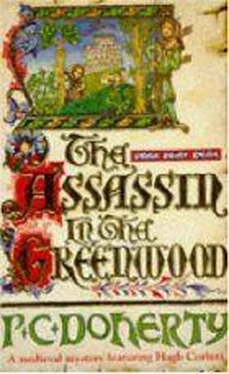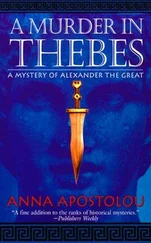Paul Doherty - Assassin in the Greenwood
Здесь есть возможность читать онлайн «Paul Doherty - Assassin in the Greenwood» весь текст электронной книги совершенно бесплатно (целиком полную версию без сокращений). В некоторых случаях можно слушать аудио, скачать через торрент в формате fb2 и присутствует краткое содержание. Жанр: Исторический детектив, на английском языке. Описание произведения, (предисловие) а так же отзывы посетителей доступны на портале библиотеки ЛибКат.
- Название:Assassin in the Greenwood
- Автор:
- Жанр:
- Год:неизвестен
- ISBN:нет данных
- Рейтинг книги:3 / 5. Голосов: 1
-
Избранное:Добавить в избранное
- Отзывы:
-
Ваша оценка:
- 60
- 1
- 2
- 3
- 4
- 5
Assassin in the Greenwood: краткое содержание, описание и аннотация
Предлагаем к чтению аннотацию, описание, краткое содержание или предисловие (зависит от того, что написал сам автор книги «Assassin in the Greenwood»). Если вы не нашли необходимую информацию о книге — напишите в комментариях, мы постараемся отыскать её.
Assassin in the Greenwood — читать онлайн бесплатно полную книгу (весь текст) целиком
Ниже представлен текст книги, разбитый по страницам. Система сохранения места последней прочитанной страницы, позволяет с удобством читать онлайн бесплатно книгу «Assassin in the Greenwood», без необходимости каждый раз заново искать на чём Вы остановились. Поставьте закладку, и сможете в любой момент перейти на страницу, на которой закончили чтение.
Интервал:
Закладка:
'Come on!' Corbett urged.
They mounted and made their way out. Corbett shielded his eyes from the sight of a figure jerking on the end of a rope as the drums began to rattle out their death beat. In a few minutes they were clear of the market place, pushing their way through the narrow alleyways into Aldersgate. At last Corbett reined in.
'It's all over, Ranulf,' he whispered, leaning over to pat his horse's neck. 'We will ride to Leighton. The Lady Maeve is waiting for us.'
'And Uncle Morgan?' Ranulf interrupted. Corbett rubbed the side of his face. 'Oh, yes, we must not forget dear Uncle Morgan!' 'And after that, Master?'
Corbett half-smiled. 'You are free to go back to London. I think I'll stay at Leighton to see what news arrives from across the channel.' He grasped Ranulf's wrist. 'But whatever happens, by Yuletide, Ranulf, you will be a man of substance, a royal clerk, ready to climb the greasy steps of royal preferment.'
On the same day Corbett rode to Leighton the French army marched on the city of Courtrai. Philip believed no force could withstand the cream of French chivalry: phalanx after phalanx of heavily armoured knights, columns of men-at-arms and serried ranks of Genoese bowmen. The French were confident of success. They, the chivalry of Europe, the finest army in Western Christendom, would ride down the simple artisans, weavers and burgesses of Flanders.
By nightfall of that same day, Philip and all the great lords of Europe were shocked to hear that this army was no more. The French had attacked but the Flemings were waiting: Philip's knights charged courageously, time and again, only to break against the massed cohorts of Fleming foot soldiers with their long pikes and short stabbing swords. Courtrai was a disaster for Philip and what was left of his army fled in haste back across the border. All the French King could do was kneel before the statue of his sainted ancestor and bitterly wonder what had gone wrong.
Around Nottingham the forest stood silent, a sea of green under the darkening sky. Hoblyn the outlaw crouched beneath the spreading branches of a great oak tree, his eyes never leaving the trackway.
Times had changed but Hoblyn, now past his fifty-sixth summer, was philosophical. As a youth he'd run wild with Robin Hood. When the great outlaw leader had accepted the King's pardon, Hoblyn had tried the path of righteousness but found it difficult to follow. He had returned to the forest, killing the King's deer, keeping a wary eye out for royal verderers and looking for the occasional unprotected traveller.
Then Robin had come back and Hoblyn had rejoined the band. Like the rest, he wondered the reason for some of Robin's actions but saw no need to question him. Robin was always a will-o'-the-wisp. He was the son of Herne the Huntsman and wove magic to blend with the trees and talk to the birds and animals as well as the goblins and elves who lurked in the forest. Now Robin had gone again. Something terrible had happened in Nottingham. The taprooms of different taverns were full of tittle-tattle: how Robin had killed the sheriff; how he had wrought vengeance on the sheriff's evil serjeant-at-arms, John Naylor; how Robin had gone away but one day would return. Hoblyn could not make sense of it. All he knew was that the outlaw and his chieftains had gone. No more would the horn sound, summoning him to a meeting or to receive whispered instructions.
Hoblyn shrugged and spat. He did not care. He was sure Robin would come again. He tensed as he heard the jingle of harness, the soft clip-clop of hooves. Round the corner of the forest track came a solitary rider. Hoblyn peered through the gathering darkness and grinned. By the looks of him the traveller was a well-fed priest. Hoblyn slipped his mask over his face, pulled his cowl forward and hurried at a half-crouch to the edge of the track. He fixed an arrow to his bowstring, waited till the rider was almost upon him and stepped out on to the path. Hoblyn pulled the bow string back, the sharp-edged arrow pointed directly at the priest's chest.
What do you want? the cleric shouted, all a fluster, gathering his reins.
'Well, for a start, the wineskin you have hung on your saddle horn.'
The priest released it and the wineskin dropped with a thud to the ground. Hoblyn moved slightly to the right.
'And the purse swinging from your belt. Be careful!' he lied. 'There are a score of others on either side of you!'
The priest licked his thick lips and stared into the darkness. He heard a crackle and rustling in the undergrowth and, gabbling with fright, unhitched the purse and let it fall.
'I am a priest,' he spluttered. 'I do God's work!'
'As do I!' Hoblyn retorted. 'Spreading God's wealth amongst the poor. You may ride on, priest!'
The priest gathered the reins of his horse in his hands. Hoblyn stepped aside to let him pass.
'Who are you?' the priest spat, glaring down at the masked, cowled figure.
Hoblyn smiled. 'Why, don't you know? This is Sherwood. Tell your friends that Robin Hood has come again!' Author's note
The battle of Courtrai was, as described in this novel, a major disaster for Philip IV, a precursor of those great defeats of the fourteenth century when massed knights suffered against groups of disciplined, well-armed and determined peasant foot soldiers.
The secret diplomatic war preceding Courtrai is also as outlined. A survey of the documents in the Public Records Office, particularly in Categories C.47 and C.49, will illustrate the heightened suspicion of the French felt by Edward I and his commanders at this time. Edward was bound by treaty to Philip and could not openly aid the Flemings. His relief at Philip's defeat is clearly evident in his correspondence following news of Courtrai.
The use of ciphers is also interesting. Some are still unbroken; others, such as that used by Edward III in 1330 in his correspondence with the Papacy, could only be solved when the historians gained access to the Vatican archives.
Nottingham too is as described, a Danish burgh built around a castle where secret passageways and galleries abound. Indeed, in 1330, when the young Edward III wished to depose his own mother and her lover Roger Mortimer, he and a number of household knights managed the coup by using one of these secret passageways to enter the castle and arrest Mortimer.
The story of Robin Hood is one of the most famous in western folklore, but did the man himself exist? My theory that he did and fought with Simon de Montfort is based on a very curious Latin poem on Folio 103 of the Registe Premonstratense (Additional Manuscript M.55 4934-5 in the British Library) which indicates that Robin Hood was known by 1304.
Andrew Wyntoun, a Scottish chronicler, in his work 'Original Chronicle of Scotland' written in 1420 also records (under a verse bearing the date 1283) that 'Little John and Robin Hood were alive then and waging their war against the Sheriff in Sherwood'.
Earlier still, in 1341, John Forduen, a canon of Aberdeen, included in his 'Scottish Chronicles' for the year 1266 the following assertion: 'About this time there arose from the dispossessed (i.e. those who fought for de Montfort) and banished that famous Robin Hood and Little John with their companions. They lived as outlaws amongst the woodlands and the thickets.'
The Assassin in the Greenwood is based on the theory that Robin Hood lived in the reign of Edward I and, according to the evidence mentioned above, was pardoned by that King. I have also woven in other references, such as Little John's being a servant of the sheriff, Robin Hood's bitter feud with Guy of Gisborne and his doomed romance with Maid Marion. The outlaw's death at Kirklees may have been as described – eighteenth-century antiquarians described his tomb there which bore an inscription not only to Robin Hood but to 'William Goldberg and a man called Thomas'.
Читать дальшеИнтервал:
Закладка:
Похожие книги на «Assassin in the Greenwood»
Представляем Вашему вниманию похожие книги на «Assassin in the Greenwood» списком для выбора. Мы отобрали схожую по названию и смыслу литературу в надежде предоставить читателям больше вариантов отыскать новые, интересные, ещё непрочитанные произведения.
Обсуждение, отзывы о книге «Assassin in the Greenwood» и просто собственные мнения читателей. Оставьте ваши комментарии, напишите, что Вы думаете о произведении, его смысле или главных героях. Укажите что конкретно понравилось, а что нет, и почему Вы так считаете.












